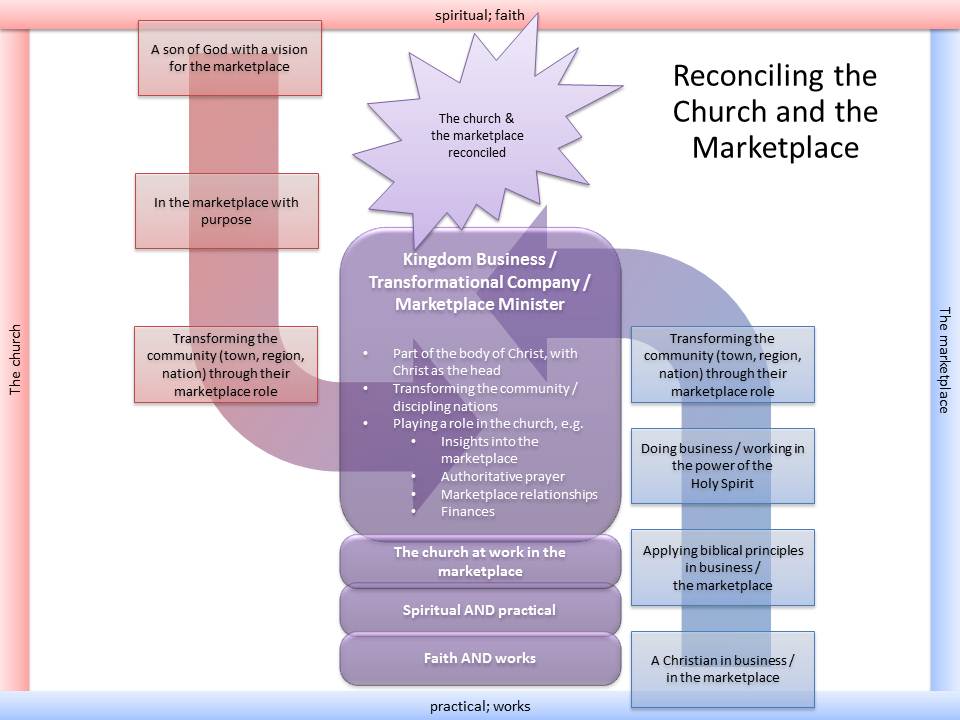A important aspect of our vision in Business for Christ is the reconciliation of the Church and the marketplace. Why does it need reconciling, you might ask, since we know that members of the Church operate every day in the marketplace?
The reconciliation that needs to take place is one that transforms the way we see the marketplace – not as an evil environment in which we merely survive, but rather as the heart of our nation, cities and towns and an environment Jesus died to redeem and we are called to disciple. Yes, we know that currently the gates of Hades are entrenched in many parts of the marketplace, but praise God the gates of Hades will not prevail against the Church!
An illustration
Here’s a way of looking at the relationship between the Church and the marketplace, and the role of marketplace Christians:
The bottom and the right hand side of the illustration represent the marketplace, the environment where we work and operate. The top and left hand side represent the Church, which we might associate with faith and our spiritual life. And the first problem is that this is exactly the trap we can so easily fall into: if we keep these two aspects of our life separate – our work and church life, considering one to be purely physical and the other purely spiritual – then we miss the point of both.
God’s purpose for Christians in the marketplace
Now, we see that many Christians who are in business or the marketplace go through several phases as they gain a revelation of God’s purpose for them. Ed Silvoso describes these phases in his book, Transformation, and they are illustrated starting at the bottom right of the illustration above. Here we see a Christian in the marketplace. Perhaps in survival mode, this person goes to work, or runs a business, and can’t wait to escape at the end of the day and to reconnect with the rest of the Church on Sunday or at a midweek meeting, to be refreshed and ready to face the world again.
Many of those marketplace Christians are at the next stage, where they are applying biblical principles in their day to day lives. If they lead a business, for example, they understand that the bible contains practical principles for daily living and marketplace life, and they apply these principles at work.
I would suggest that this second stage is also where most of the world’s ethical businesses are. Most listed companies, and many privately owned companies, would seek to operate as good corporate citizens. The principles that they apply to do so can be traced back to biblical principles such as those for leadership, fairness, finances, looking after the poor, or caring for the environment. Personally I have found little of value in the business books of the world that has not already been quoted by one of the biblical prophets, by David or Solomon, Jesus, the Apostles, or elsewhere in the Bible.
Operating in the power of the Holy Spirit
Now, at the third stage (the third box from the bottom on the right hand side of the illustration), the life of a Christian in the marketplace starts to take on an exciting edge as they operate in the power of the Holy Spirit. To do this, they must have moved a long way from the ‘survival’ mode of the first stage, to see that God wants to be part of what they are doing day to day. I have written before about the power of doing business in the power of the Holy Spirit.
Now, the ultimate stage is when a Christian recognises that their role in the marketplace is to be part of the body of Christ, bringing about the transformation of the community – such as their school, industry, neighbourhood, city, and nation.
Planting Transformational Marketplace Ministers
Meanwhile, at the top left of the illustration we see a Christian who is in the Church and has a particular vision for the marketplace. This might be somebody who has a heart to embark on a new career, or to start a business, or who is about to start a university course, for example.
I have illustrated this left hand side progression to demonstrate the opportunity that exists to equip people in the Church for effective marketplace ministry roles, without them having to start right at the beginning of the marketplace path outlined above. In order for them to approach the marketplace with purpose, and to rapidly reach the same place of transformational effectiveness, the opportunity is to equip them for marketplace ministry from the start.
This is why I am so excited by initiatives like the Young Entrepreneurs Business School being established by Jubilee Church, which hosted our Business for Christ meeting in March. What an exciting opportunity for those with a heart for business to become marketplace ministers, fully equipped not only with the practical tools to establish and build a business but a clear vision for their spiritual role in this too.
The practical and spiritual working together
So when we bring this all together we see that whichever approach we take, the reconciliation of Church and marketplace will result in what we might call a ‘kingdom business’ or ‘transformational company’ or a ‘marketplace minister’ (whatever term we use doesn’t really matter), part of the body of Christ with Christ as the head, transforming the community, playing a role in the body through areas such as identifying and sharing the needs of the community; praying into areas where they have been given authority; developing marketplace relationships; or playing a role in finances.
With the reconciliation of the church and the marketplace, we will see the practical and spiritual at work together; as we operate by both faith and works to see our nations discipled.
The role of finance
Finally, a word about finances. I mentioned ‘playing a role in finances’ last in my list of areas where marketplace ministers might operate in the Church. It is easy to jump to the conclusion that the primary role of Christians in business or the workplace is to raise finances to fund those ‘in the ministry’. Having a generous heart and a biblical approach to giving – something we see in both the Hebrew people of the old testament, and the New Testament Church – is a very important aspect of our walk in the marketplace. But in my experience, it is rarely the primary purpose. Get this wrong and we risk missing the huge potential that is realised when we see our marketplace role as ministry in itself.
Standing in faith together
So, as we meet together at Business for Christ, we journey together, learn, seek God, encourage each other and stand in faith together. I believe you’ll grow in this as much as you want to. Ask God to show you more of His purpose for you in the marketplace.
If you’re in or around Kent in the UK, why not join us at one of our next meetings or events?




